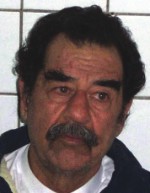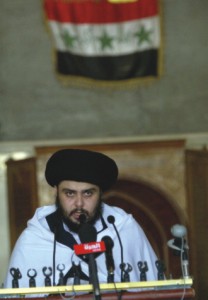|
International
IRAQ Bush's Islamic Republic
Peter W Galbraith
(Continued from previous week)
IV
Days after the Kurdistan National Assembly convened in June, it elected Kurdistan Democratic Party leader Masood Barzani as the first president of Kurdistan. Before so doing, it passed a law making him commander in chief of the Kurdistan military but then specifically prohibiting him from deploying Kurdistan forces elsewhere in Iraq, unless  expressly approved by the assembly. (Kurdistan retains some 50,000 peshmerga under the direct control of the Kurdistan government.) The assembly also banned the entry of non-Kurdish Iraqi military forces into Kurdistan without its approval. Kurdish leaders are mindful that their people are even more militant in their demands. Two million Kurds voted in a January referendum on independence held simultaneously with the national ballot, with 98 percent choosing the independence option. expressly approved by the assembly. (Kurdistan retains some 50,000 peshmerga under the direct control of the Kurdistan government.) The assembly also banned the entry of non-Kurdish Iraqi military forces into Kurdistan without its approval. Kurdish leaders are mindful that their people are even more militant in their demands. Two million Kurds voted in a January referendum on independence held simultaneously with the national ballot, with 98 percent choosing the independence option.
Kurdistan's leaders would like Iraq to be a loose confederation in which Kurdistan makes its own laws, retains its own military, the Iraqi military stays out, and Kurdistan manages its own oil and water resources. Although Iraq's interim constitution, the TAL, talks of "federalism," it has been implemented so as to create no more than a confederal relationship between Kurdistan and the rest of Iraq. The Kurdish leaders would accept its continuation provided the text was clarified to assure Kurdistan's ownership of petroleum in the region and if the status of the disputed region of Kirkuk were resolved.
While the Shiite religious parties accepted the TAL when it was promulgated in 2004, the Kurds now believe they don't mean it. When he swore in his cabinet on May 3, 2005, Shiite Prime Minister Jaafari eliminated the reference to a "federal Iraq" from the statutory oath of office; this so angered Barzani that he forced a second swearing-in ceremony. Some Shiite drafts for Iraq's permanent constitution would sharply restrict Kurdistan's autonomy and demote Kurdish from its current status at the federal level as an official language equal with Arabic. The Kurdish leaders also worry that the Shiites will try to eliminate Kurdistan's current ability to modify the application of national law in Kurdistan; they fear that the Shiites will, at least, stop secular Kurdistan from rejecting the imposition of Islamic law.
V
In his speech, President Bush alluded to the importance of Iraqis meeting their deadlines. The deadline that looms is August 15 for the National Assembly to adopt a constitution. As of this writing, great effort has been devoted to questions of expanding the drafting committee to include Sunni Arabs. Very little has been done on the substantive work of writing a constitution.
 Because the differences among Iraq's three communities are so great, it seems unlikely that they can find common ground on a constitution by August 15, if ever. But the deadline could be met if the assembly agrees simply to continue the TAL, with some modifications of the provisions on oil and Kirkuk. The Shiites have a desire similar to the Kurds' for oil to be owned and managed by the regions. The Shiite south sits on top of nearly 80 percent of Iraq's known oil and, like the Kurds, the Shiites feel the old system of central management enriched Baghdad and the Sunni Arabs without providing any benefits to the regions owning the oil. Shiite leaders from the three oil-rich southern governorates have already proposed to create a southern region that, like Kurdistan, would have its own oil. Because the differences among Iraq's three communities are so great, it seems unlikely that they can find common ground on a constitution by August 15, if ever. But the deadline could be met if the assembly agrees simply to continue the TAL, with some modifications of the provisions on oil and Kirkuk. The Shiites have a desire similar to the Kurds' for oil to be owned and managed by the regions. The Shiite south sits on top of nearly 80 percent of Iraq's known oil and, like the Kurds, the Shiites feel the old system of central management enriched Baghdad and the Sunni Arabs without providing any benefits to the regions owning the oil. Shiite leaders from the three oil-rich southern governorates have already proposed to create a southern region that, like Kurdistan, would have its own oil.
Control over Kirkuk, an ethnically mixed governorate, will be much more difficult to solve. The Kurds insist it is the heart of Kurdistan, and believe a great injustice was done when Saddam expelled Kurds from the area and resettled Arabs in their place. But Kirkuk also has indigenous Arabs, Turcomans, Assyrians, and Chaldeans. The Kurds and Shiites could make a deal to have a referendum to determine Kirkuk's future, which, since the Kurds are now again likely to have a majority, could be significantly at the expense of the Sunni Arabs. But not entirely, since Kirkuk's Arabs and Turcomans are both Sunni and Shiite.
In the coming constitutional battle, Kurdistan leadersand many secular Arab Iraqiswill be drawing the line on three principles: secularism, the rights of women, and federalism. They fear that President Bush will be more interested in meeting the August 15 deadline for a constitution than in its content, and that they will be under pressure to make concessions to the Shiite majority. It may be the ultimate irony that the United States, which, among other reasons, invaded Iraq to help bring liberal democracy to the Middle East, will play a decisive role in establishing its second Shiite Islamic state.
In fact an agreement on the constitution in the National Assembly may not end Iraq's sectarian divisions but set the stage for new battles. Voters must approve the constitution in a referendum scheduled for October 15, and under the TAL two thirds of the voters in any three governorates may veto it. There are three Kurdish governorates, but also three Sunni Arab governorates. Even if Kurdistan's leaders reluctantly accept a Shiite-written constitution, the independence-minded Kurdistan electorate may reject it. Moreover, the Sunni Arabs could easily use the referendum to torpedo any ShiiteKurdish agreement.
 The ratification clause of the TAL creates a timed fuse that could blow Iraq apart, and as is true for so much else that has gone wrong, it is American arrogance and ignorance that are to blame. When Iraq's Governing Council was considering the TAL in February 2004, the Kurds came up with a simple proposal to protect their existing autonomy: the permanent constitution would come into effect if ratified by a majority of Iraqis, but would only be operative in Kurdistan if ratified by a majority of Kurdistan's voters. This simple formula, which involved no veto on the ratification on the constitution but only a geographic limitation on where it would apply, was largely acceptable to the Arab Iraqis. But it was not acceptable to the American administrator, L. Paul Bremer, who did not want to concede that Iraq's ethnic communities should be treated differently. He came up with the three-governorate formula, preparing the way for a future train wreck. The ratification clause of the TAL creates a timed fuse that could blow Iraq apart, and as is true for so much else that has gone wrong, it is American arrogance and ignorance that are to blame. When Iraq's Governing Council was considering the TAL in February 2004, the Kurds came up with a simple proposal to protect their existing autonomy: the permanent constitution would come into effect if ratified by a majority of Iraqis, but would only be operative in Kurdistan if ratified by a majority of Kurdistan's voters. This simple formula, which involved no veto on the ratification on the constitution but only a geographic limitation on where it would apply, was largely acceptable to the Arab Iraqis. But it was not acceptable to the American administrator, L. Paul Bremer, who did not want to concede that Iraq's ethnic communities should be treated differently. He came up with the three-governorate formula, preparing the way for a future train wreck.
VI
There are two central problems in today's Iraq: the first is the insurgency and the second is an Iranian takeover. The insurgency, for all its violence, is a finite problem. The insurgents may not be defeated but they cannot win. This, of course, raises a question about what a prolonged US military presence in Iraq can accomplish, since there is no military solution to the problem of Sunni Arab rejection of Shiite rule, which is now integral to the insurgency.
Iraq's Shiites endured decades of brutal repression, to which the United States was mostly indifferent. Iran, by contrast, was a good friend and committed supporter of the Shiites. By bringing freedom to Iraq, the Bush administration has allowed Iraq's Shiites to vote for pro-Iranian religious parties that seek to createand are creating an Islamic state. This is not ideal but it is the result of a democratic process.
 The Bush administration should, however, draw the line at allowing a Shiite theocracy to establish control over all of Iraq. This requires a drastic change of strategy. Building powerful national institutions in Iraq serves the interest of one grouptoday it is the Shiitesat the expense of the others, and inevitably produces conflict and instability. Instead, the administration should concentrate on political arrangements that match the reality in Iraq. This means a loose confederation in which each of Iraq's communities governs itself, and is capable of defending itself. It may not be possible to accomplish this in a constitution, since the very process of writing a constitution forces these communities to confront issuesreligion, women's rights, ownership of oil, regional militaries that are hard to resolve ideologically. The Bush administration should, however, draw the line at allowing a Shiite theocracy to establish control over all of Iraq. This requires a drastic change of strategy. Building powerful national institutions in Iraq serves the interest of one grouptoday it is the Shiitesat the expense of the others, and inevitably produces conflict and instability. Instead, the administration should concentrate on political arrangements that match the reality in Iraq. This means a loose confederation in which each of Iraq's communities governs itself, and is capable of defending itself. It may not be possible to accomplish this in a constitution, since the very process of writing a constitution forces these communities to confront issuesreligion, women's rights, ownership of oil, regional militaries that are hard to resolve ideologically.
Many of these issues, however, could conceivably be worked out practically. For example, the Iraqi Ministry of Oil and the Kurdistan government are currently cooperating on fulfilling oil contracts made by the Kurdistan government, without having to face the constitutional issue of who owns the resources. Without having to make a constitutional decision on religion, the Shiite south can apply Islamic law as it now does and Kurdistan can remain secular.
War always has unintended consequences. Currently we are pursuing a strategy that will not end the insurgency but that plays directly into the hands of Iran. No wonder Agha Panayi, the Iranian intelligence official, was smiling.
This article was first published in the New York Review of Books. Copyright
(R) thedailystar.net 2005
|
| |
